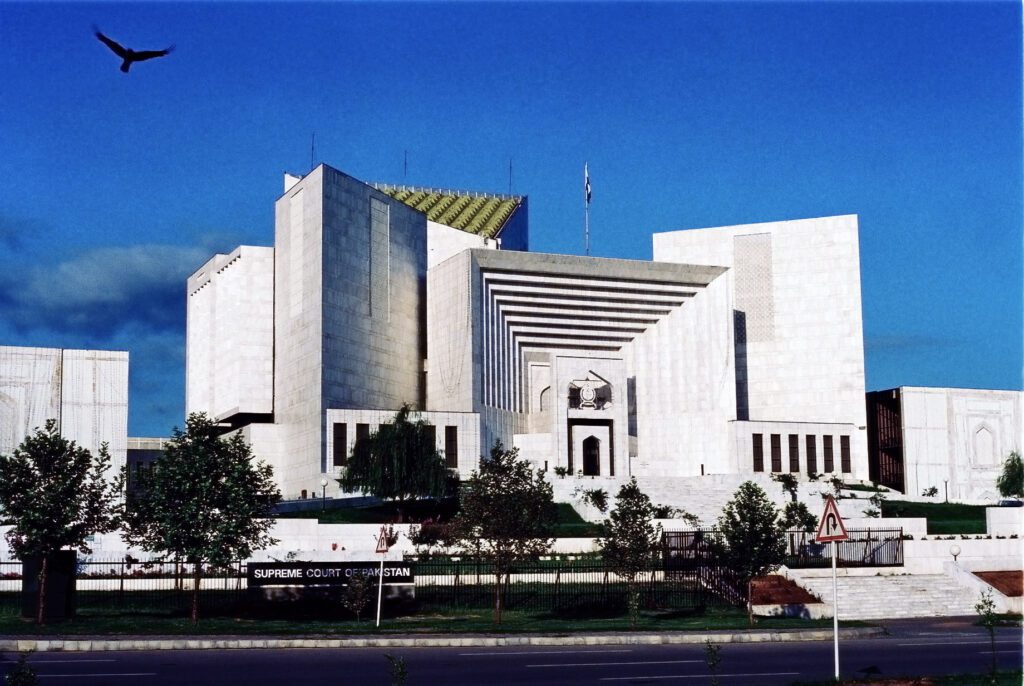- Web Desk
- Yesterday
Parliamentary panel cannot review judicial commission’s recommendations on judges’ appointment: SC
-

- Javaid Soomro
- Sep 26, 2023

ISLAMABAD: The Supreme Court has issued a significant ruling regarding the appointments of judges in the higher judiciary stating that the parliamentary committee cannot review judicial commission’s recommendations on the appointment of judges.
The parliamentary committee had challenged the Peshawar High Court’s decision regarding the appointment of three judges of lowers courts. The federal government had challenged the PHC’s decision in the Supreme Court. The Supreme Court upheld the Peshawar High Court’s decision with a two-one majority with a dissenting note of Justice Athar Minallah.
The three-member bench consisting of Justice Munib Akhtar, Justice Muhammad Ali Mazhar and Justice Athar Minallah issued the ruling.
The verdict said that the parliamentary committee had sent the matter (of the appointment of three judges) back to the Judicial Commission for reconsideration. However, the Peshawar High Court declared the parliamentary committee’s recommendations null and void. The Supreme Court upheld the High Court’s decision.
The ruling said that the independence of the judiciary, a fundamental pillar of the constitution, has been upheld.
“The powers of the three pillars of the state are clearly defined in the constitution. The principle of seniority is a crucial element in the civil service. Promotions are only granted based on seniority, and no one can be promoted without adhering to this principle. The Supreme Court’s decision emphasizes the importance of merit and competence in promotions and high-level appointments,” it said.
In order to ensure progress and the highest standards of competence, the judiciary relies on the principles of merit and eligibility. The scrutiny for eligibility is carried out when all candidates are equally qualified. The merit-based system allows qualified and capable individuals to rise through the ranks. The judicial appointments are crucial for the judiciary’s proper functioning, it said.
“All members of the Judicial Commission hold equal importance in the process of appointing judges. The recommendations of the Judicial Commission cannot be reviewed by a parliamentary committee. The skillset of the committee members differs from those of the Judicial Commission. The Judicial Commission’s role is to evaluate the eligibility and competence of judge nominees.
The parliamentary committee and the Judicial Commission can operate within their respective boundaries. The parliamentary committee cannot base its decisions on personal preferences and biases. It can either accept or reject judge nominations but cannot send them back to the commission. The courts must respect the decisions made in the past.
Justice Athar Minallah has issued a dissenting note on the appeal against the Peshawar High Court’s decision. His note spans 36 pages, highlighting the contentious issues.
In the dissenting note, Justice Athar Minallah said that during the tenure of Ayyub Khan, interviews for judges’ appointments were conducted. The current dispute highlights the implications of these decisions.
Shake-up in Supreme Judicial Council, Judicial Commission
“The Supreme Court has rendered ineffective the powers of parliament in two judicial decisions. These decisions have granted the chief justice unbriddled powers. These decisions have expanded the chief justice’s authority indefinitely. Prior to constitutional amendments, judges were appointed by the judges themselves. After the amendment, the judicial appointment process was modified,” he said.
The judge said: “Many times, martial law was justified, and severe acts of treachery were legally sanctioned. In the past, those who insulted parliament were given immunity. In the past, the Supreme Court hanged an elected prime minister. The actions mentioned were all taken during the past seven decades, when judges appointed judges. Even then, it was said that there was no independent judiciary.”
“The Judicial Commission comprises a majority of active service and retired judges. There were serious allegations against all three district judges, but they were still performing their duties. The Judicial Commission failed in delivering justice within its own framework,” the dissenting note said.
“The Judicial Commission should not decide appointments based on favoritism or prejudice. Transparency is essential in the merit-based appointments of the higher judiciary. Judges’ appointments should be based not only on merit but also on solid reasons.”
Justice Athar Minallah said that “appointments made without transparency can lead to suspicions and doubts. Such appointments negatively impact the judiciary’s independence. Transparency can safeguard the independence of the judiciary. During Ayub Khan’s era, the district judges were also competent to perform their duties without hearing opinions. The Judicial Commission only managed to secure the district judges’ appointments based on the PHC chief justice’s opinion.”
The judge said tha appointments without consultation can raise questions. Judicial Commission should not compromise the judiciary’s independence. Ultimately, the judiciary’s freedom can be severely compromised without proper oversight.
The Peshawar High Court had invalidated the parliamentary committee’s recommendations. The Supreme Court upheld the high court’s decision.
The PTI government had requested the Supreme Court to hear the appeal against the Peshawar High Court’s decision. A three-member bench heard the request for a review.




